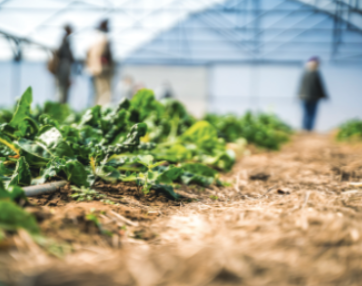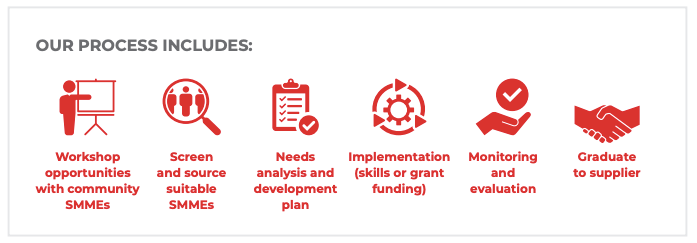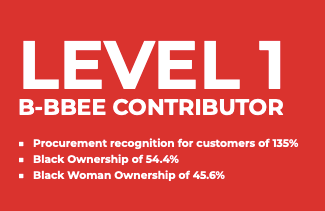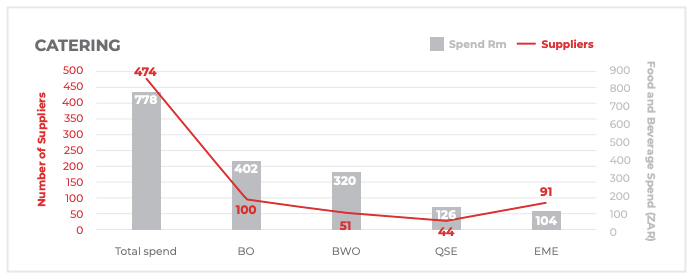INTRODUCTION
As part of the Tsebo Solutions Group, Tsebo Catering embraces its parent company’s transformation ethos through entrepreneurial partnerships that create opportunities for vibrant Small, Medium and Micro Enterprises (SMMEs) marketplaces. This ethos guides us to ensure that we develop, employ, capacitate and partner to the benefit of the communities we work in. What this means for Catering is that we not only aim to source locally produced meat, poultry, vegetables, ingredients, packaging and other relevant supplies from these communities, but we also help small businesses to scale-up into credible, reliable and profitable corporate supply-chain partners

THE CHALLENGE
While entrepreneurship and SMMEs are frequently cited as a solution to South Africa’s high unemployment rates, between 70% to 80% of small businesses fail in their first year, and only about half of those that survive will make it through the next five years.
The reasons for this are complicated and varied, but it is unfortunately common for small businesses to fail just as they are beginning to grow. Some of the reasons for this include insufficient capital, poor production management, failure to comply with health and safety and other industry specific standards, a loss of quality as demands increase, and inadequate planning and cash-flow issues.
To overcome these (and other) challenges, Tsebo works hand-in-hand with its partners to help them grow sustainably.
OUR SOLUTION
At Tsebo Catering, enterprise development is not simply ‘a nice to have’ but is part and parcel of what we do. From the start, our engagement with clients includes identifying SMMEs in the areas in which we operate and which are linked to our client sites.
The goal is to support local-to-local SMME development through capacity building, grant funding and mentorship. We work with local communities to identify challenges in economic participation and to craft solutions together.

We invest heavily in a supplier development programme (Tsebo Phakiso) that focuses on providing black-owned SMMEs with specific skills needed to enable growth. SMME suppliers linked to our supply chain receive technical training to enable growth in profits, job opportunities and increased economic participation.
Depending on the needs of a participating SMME, a development plan may include a bouquet of ‘skills transfer modules’ as part of the implementation or grant funding to support operations.
LEVEL 1 B-BBEE CONTRIBUTOR
“Tsebo’s BO and BWO, together with our Level 1 B-BBEE status, provides procurement recognition benefits for our clients; potentially three times the score for spend with Qualifying Small Enterprises (QSEs) and Exempted Micro Enterprises (EMEs).”

Tsebo is one of the highest rated large employers on the Department of Trade and Industry’s generic B-BBEE scorecard, and is a certified Level 1 B-BBEE contributor with a procurement recognition of 135%. Our Black Ownership (BO) component continues to grow and currently stands at 54.4%, with a 45.6% Black Woman Ownership (BWO) element.
BENEFITS AND OUTCOMES
Tsebo Catering has almost 700 business units across the country with a combined spend of more than R1- billion on food and beverages a year. We help SMMEs by ensuring that part of this spend goes to small businesses, while simultaneously supporting them and scaling volumes to allow them to grow at their own pace.

CIELI BLU
Cieli Blu is a 100% black-owned, Level 1 B-BBEE enterprise based in Durban. The company began supplying two of Tsebo’s catering units with fruit and vegetables in December 2020. Our auditors were impressed with the high standards of their facilities and access to quality produce – it was clear Cieli Blu had the potential for growth. Tsebo invited them to bid against other suppliers in KwaZulu-Natal and the company began supplying more units.
Cieli Blu experienced some initial teething problems while ramping up supply to meet the high volumes required by a large commercial caterer. To support them in their growth, Tsebo buffered supply with alternatives where necessary so as not to exert too much pressure on the growing business. By the second quarter of 2021, Cieli Blu had increased its supply of fruit and vegetables to 40 units, or 50% of Tsebo Catering’s requirements for KwaZulu-Natal.
When unrest broke out in South Africa in July, the majority of businesses in KwaZulu-Natal closed down, including the fresh produce market. However, Tsebo still urgently needed to provide food and services for its hospital clients. The MD of Cieli Blu took it upon himself to source produce directly from farmers and braved the unrest to personally deliver the food to the various units.
THE FAIR FOOD COMPANY In 2017, a major Tsebo Catering client asked for assistance in its efforts to support local farmers. Tsebo partnered with the Fair Food Company, which aims to help small, local farmers benefit from value chains. Smallscale farmers make very little profit when selling through a middleman and Fair Food Company aims to facilitate sales directly to clients.
By pooling volumes from a number of small-scale farmers, Fair Food Company was able to supply the volumes required for direct sale to Tsebo.
The company began by supplying one unit in KwaZulu-Natal in 2017 and grew to supplying 80% of Tsebo’s KwaZulu-Natal requirements by the end of 2019. Their supply was set to increase to a number of units in Gauteng, however the COVID-19 pandemic hampered their ability to supply the large volumes required. The company is currently rebuilding and Tsebo continues to support their efforts to resume full operation.



